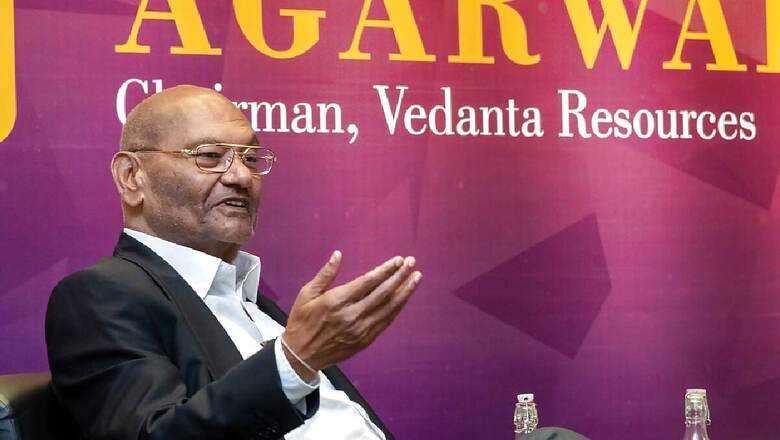
views
Commenting on the country’s dependence on the import of gold and copper, Vedanta Chairman Anil Agarwal on Tuesday said India has good resources of copper and gold but is heavily import-dependent for both. He called for increased private sector participation to unlock the potential of these vital sectors.
In a post on X on Tuesday, Agarwal said, “Aaj ke samay mein sona aur tamba, inka mahatva bahut zyaada ho gaya hai (In today’s times, the importance of gold and copper has become significant). In times of global uncertainty, the price of gold goes up as people buy more of the precious metal. Copper demand is being fuelled by the technologies of the energy transition. Prices of both gold and copper are at, or near, record highs.”
As global markets face uncertainty, the demand for gold as a safe-haven asset increases, pushing its price higher. Simultaneously, the transition towards sustainable energy technologies has intensified the demand for copper, essential for various applications in renewable energy infrastructure.
Agarwal said that despite having significant resources, India remains heavily dependent on imports for both metals.
“India has good resources of copper and gold. But we are heavily import dependent for both. India consumes around 900 tonnes of gold each year but produces only 1 tonne domestically. Our imports of gold every year are worth $45 billion or Rs 3.4 lakh crore. In copper, we import 95 per cent of our requirement worth over $3 billion a year or Rs 24,000 crore,” Agarwal noted.
Agarwal highlighted the stagnant production levels of public sector enterprises in the gold and copper sectors.
“What is common in both gold and copper is that we have public sector companies in each. In gold, they are the Hatti Gold Mines owned by the Government of Karnataka, and Bharat Gold Mines owned by the Government of India. For copper, it is Hindustan Copper Limited. Production has been more or less stagnant,” he observed.
He said some may say there aren’t any reserves or resources left but I believe that with additional investment and the latest technology, both these assets have huge potential.
Recognising the risks and the government’s other spending priorities, Agarwal advocates for private sector participation as the most viable solution. “Of course, it is a risky investment because we cannot be sure of the outcome. Government has other priorities for spending. Under the circumstances, inviting private sector participation is the best way out. If the Government of India and Karnataka divest their shares, private companies are capable of acquiring them,” he asserted.
Agarwal envisions significant economic benefits from such a policy shift. “If it succeeds, the Government will earn a huge amount of revenue through taxes and royalties. There should not be any retrenchment. In fact, with import substitution, both these industry expansions and the development of thousands of downstream industries, massive jobs will be created. This is the need of the hour,” he tweeted.
“A positive outcome will be hugely beneficial for Bharat,” Agarwal concluded.













Comments
0 comment